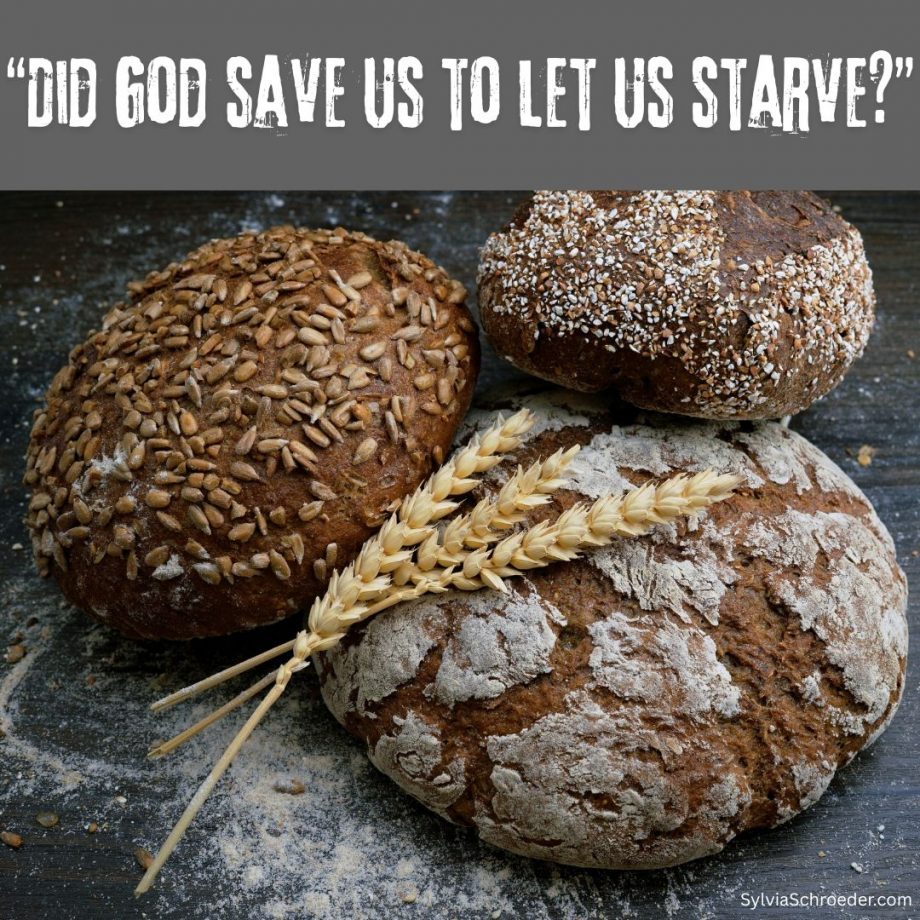“Did God save us to let us starve?”
I may not have said it quite like the complaining Old Testament Israelites are recorded after their exodus from Egypt, but I may have had that very same attitude. Their question in other forms has grumbled through my own vacant soul-wanderings.
The Israelites said to them, ‘If only we had died by the Lord’s hand in Egypt! There we sat around pots of meat and ate all the food we wanted, but you have brought us out into this desert to starve this entire assembly to death.’ (Exodus 16:3 NIV)
Is it possible that those empty internal rumblings at times reflect a much deeper issue than the discontentments of life’s circumstances, but actually a dissatisfaction with who God is?
One Thanksgiving, when our young family lived in Italy, we joined with some friends who had a ministry to American troops stationed in Vicenza. They provided a Thanksgiving meal in their home for the young soldiers. I had the privilege and task of making bread for a large number of military personnel away from home for the Thanksgiving holiday.
I made some 20 loaves of fresh bread.
They lined every space in my kitchen. The house smelled divine.
This week I read these words from John 6, “Jesus said to them, “I am the bread of life; whoever comes to me shall not hunger, and whoever believes in me shall never thirst.” (John 6:35 ESV)
This entire chapter is flanked by bread. All of it, the hungry crowd, the reference to Moses and manna, point to, Jesus, the Bread of Life.
Jesus’ reputation as miracle-worker brought the curious, the thrill-seekers, and the needy. And so, a multitude followed Him to the sea of Galilee. Jesus asked Philip, “Where are we to buy bread, so that these people may eat?” (John 6:5b ESV)
Andrew suggested a young boy, but he had only five barley loaves and two small fish. It was enough. Jesus fed 5,000 men with it and the entire crowd probably totaling more than double that number. Afterwards they gathered up twelve baskets of leftovers.
Later in the same chapter, Jesus referred to the Old Testament patriarch Moses. Well versed in Jewish history, those who heard Jesus knew the story of the burning bush and God’s introduction as the Great I Am.
But, despite God’s mighty miracles, soon after the Israelite’s exodus, they threw up their arms, and grumbled and complained at Moses.
“But you have brought us out into this desert to starve this entire assembly to death.” (Exodus 16:3 NIV)
They felt nostalgic for the life of slavery they once led. They forgot I Am Himself brought them freedom. They accused Moses for their dissatisfaction.
Did you save us to let us starve?
Sometimes we may feel as if our purpose seeps through the cracks of our diminishing vitality as years wash over us. We can be guilty of the same complaining attitude the Jewish people displayed in the desert, did you save us to let us wither and wane? Did you save us to leave us alone and frail?
One of the perils of advancing years is to wonder if God has taken us this far only to drop us for a younger, fresher version.
Moses, set apart by God accomplished great things at age eighty. His life met new purpose and direction. His hold on us through our journeys past, has prepared us for what He wants to accomplish.One of the perils of advancing years is to wonder if God has taken us this far only to drop us for a younger, fresher, version. Share on X
Do you really believe God saved us to let us starve of meaning and purpose now, in this season of our lives?
Surely He holds on to us now too.
When life gets tough and my influence and value feels like it’s waning, when I’m tempted to fall into an inaccurate nostalgia, I must remember. I was once lost in slavery like the Israelites, but Jesus set me free, and as long as He gives breath, I serve Him.
“I am the bread of life,” Jesus said.
There is a craving in our souls for Living Bread, yet, we get hung up with the kind that doesn’t last, and it brings a longing for younger years and different endings. It questions the validity and value of our lives, as if God can no longer use us.
He saved us not to starve us but to fill us.
On that day, on that hillside, as Philip and the other disciples collected the twelve baskets of leftovers, there may have been some who missed the point. But there were others. They understood that the Incarnate God walked among the people. As they sat and ate the bread and fish, they recognized the Bread of Life.
One day in Italy we had enough bread to feed an army. And the next, it was gone. Our bellies growled. We were famished.
Jesus looked over the crowds, and saw each hungry heart.


Cheryl Balcom
Loved this, Sylvia! As long as we have breath we have purpose. 😊 Keep writing, friend!
Sylvia schroeder
Cheryl, how much I needed that little bit of encouragement this morning! Thank you!!
Gina Castell
I always love and welcome your writing. So right. ❤️ G
Sylvia schroeder
Thank you Gina! So glad you enjoyed it!
Don Pahl
A great reminder for us Ecclesiastes 12 folks, Sylvia! Thanks!
Sylvia Schroeder
I confess I had to go and read Ecclesiastes 12 again. I guess I am one of those folks too! Thanks Don!
Lorelei
Thanks so much for this needful reminder, dear Sylvia. He is faithful and I want to be, too.
Sylvia Schroeder
Thank you Lorelei. I am so grateful for His faithfulness!